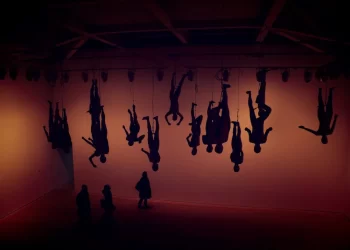“What about rape squads in Arab countries like Egypt?”, ABC asked. “What about them?” I asked. “Anyone seen not wearing a hijab is publicly gang-raped. There’s a word for it in Arab as well, I’ll tell you, nobody intervenes as it’s the norm and completely normal,” ABC said. “And?”, I asked, wondering where it was going. “My point is they subjugate women and treat them like shit so its [sic] no surprise that they use shit analogies to define women.” “There is no “they” here and no “us” here,” I said, adding further that it did not really prove anything except the continuing subjugation of women by men.
I had already told her that when it came to unfair and even cruel treatment of women at the hands of men, no culture or people were any better than any other culture or people, the only difference being that the extent and degree of oppression and subjugation in different cultures and among different people has been different at different times, but at one time or the other, all people and cultures have treated their women with cruelty and have gone to extraordinary lengths to oppress and subjugate them.
Cultures and people aside, even in the areas of science, art and philosophy, women have been treated extremely unfairly with their achievements historically downplayed over and over again compared to those of their male counterparts. But something deplorable does not become less so just because everybody does or has done it at some point. So, yes, it is certainly unfortunate and regrettable that men, under patriarchal social setups, have routinely subjugated and oppressed women, and if the Egyptians have been inflicting sexual violence on their women for any reason whatsoever, it’s just as reprehensible. What else could I or anybody else say? So what really was the point of bringing up the Egyptian brand of female subjugation anyway, I wondered. More importantly, what did “they” refer to exactly — the Egyptians, the Arabs or some other group or class of people?
Next, ABC shared a picture displaying juxtaposed images of the headlines of two separate news stories published by the same media establishment, one lauding the freedom to don burqa in a western country and the other critical of Haryana’s ghoonghat tradition. ABC saw hypocrisy and double-standards at play, as many other might do, in the treatment of two issues in the media. “Ghoonghat is not comparable with hijaab; it’s the equivalent of “naqaab”. So that’s one issue with it. And it’s not the only issue. The distinction between “choice” and imposition is the difference here. Not ghoonghat and hijaab. As long as you are free to not put them on, and you choose to, it’s a choice. When the socio-cultural background you come from makes it a norm you cannot deviate from, it’s an imposition,” I said.
“Why are we even concerned about Egypt or Arabic? Or what ‘aurat’ means in Arabic. We use the term ‘aurat’ all the time in India, and it just means an older female who is not a ‘girl’, and that’s about it. To go into the Arabic roots makes no sense here. The question is, why is this debate being raked up? What purpose it serves?” I said, trying to indicate to ABC that while the discussion about female subjugation was fine, the demonizing slant of it was problematic.
The oppression of women “is not new, and it’s not unique to any specific culture or country. A lot of cultures are a lot worse, and a lot better than us [sic],” I said. She responded, “I think we know the worst amongst all. I accept that there has been oppression of women by the world but still i feel thats there.” “You know the worst amongst all? What do you mean? And who is the worst?” I asked. “Islamist fundamentals radical whatever we might call them,” she said.
I ended the textual discussion right there, intending to explain to ABC over the phone or in person that it was the fundamentalism itself that was the problem and not this or that kind of it, for one fundamentalism was not better or worse than any other, all of them being equally bad; nor was one fundamentalist different from another in their desire to ensure a complete subjugation or annihilation of the “other” by all means necessary. It’s not whether they would rape, kill and maim en masse but when, for radicalism of all stripes comes with inbuilt genocidal tendencies. And the offending “other” can be anybody — man, woman, people belonging to different castes, class or religion and also people belonging to the same class, caste or religion as the radicals and conveniently called “traitors” solely for not siding with the fundamentalist elements.
However, missing that point was not as big or as fundamental a problem as the confirmation bias glaringly evident in the way ABC seemed to have gone about first concluding who was the “worst” and then looking for evidence to support her conclusion, readily and unquestioningly accepting all evidence in favour and just as readily rubbishing everything that did not agree with her preconceived notions. Else, she would not have missed, among other things, that the imposition of ghoonghat is no different from the imposition of hijab, and the only reason why ghoonghat is not brutally enforced is because liberal and progressive Hindus (regularly ridiculed now) still far outnumber radical Hindus, whose number is steeply rising. Hindus have, by and large, been resistant to radicalization, but it might be changing. And, no, Islamist fundamentalists are so far not the “worst” even in the respect of which ABC was speaking. More on that later.
…to be continued
Originally published as part of my monthly column Street Lawyer in the March 2022 Issue of Lawyers Update (Vol XXVIII, Part 3).






